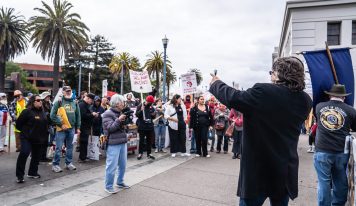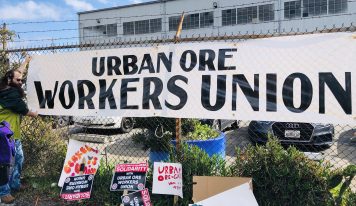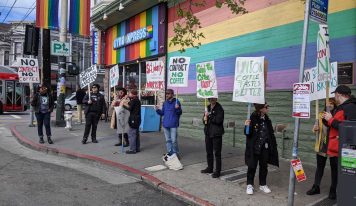The San Francisco Independent Journal recently had the pleasure to talk with long-time socialist and DSA member Tom Gallagher. The American Left has seen many transformations over the past few decades and Gallagher been there through it all. He was the first socialist Massachusetts state legislator since the 1920s when he served in the state’s House of Representatives from 1980 to 1986. His career as a politician, activist, author, and educator has brought him around the world and to mingle with many prominent figures. He is known around San Francisco for his involvement in local progressive politics where he continues to advocate for issues such as foreign policy. Most recently in 2020, he primaried as a progressive alternative to Nancy Pelosi in the 12th Congressional District. Read our conversation below.
You can find his work at: Tom Gallagher Writes.
Can you talk about how you held office in Massachusetts as a declared socialist and how that experience shaped your political growth?
I ran first against the 14-year incumbent in 1978. I knew fairly little of the system, particularly in the state legislature, as was also the case for the campaign manager. We just decided, “Hey, we can figure this out.” I had taken the point of view that I’ve been around the Left for a decade. At that point, I was just 29. We thought that if we had all the answers then why weren’t we running for office.
We were so far removed from the circuit that for some time, we were working on the wrong map. It had been recently changed and we were looking at the wrong electoral district, and then somebody pointed out that the districts have been changed. The guy who held the seat was sort of an old-school conservative in the Democratic Party, as all politics in Boston were at that point. I first ran in 1978 and my name recognition would have been at 1 percent or so when I started. I got 47 percent of the vote out of nowhere and I got into this dreaded zone that I didn’t want to be in. I wanted to either win or lose big and get it out of my system. I didn’t want to specifically get between 45 to 50 percent because I knew I would be doomed to do it again. So, then I ran again two years later in 1980 and won.
As far as being a socialist, it was known to anybody who wished to know it. I acquired a nickname in the House, under memorable circumstances: Tommy the Commie, which was more affectionate than not.

Tell me a little bit more about your experience from the East Coast. I’ve read that you encountered some pretty interesting figures around the Boston scene, including George McGovern, the presidential candidate against Nixon, and even Howard Zinn.
I believe I hold the distinction of being the only person to have been a Democratic National Convention delegate for both George McGovern and Bernie Sanders. McGovern’s last race for president––that very few people are aware of––was in 1984, which is during the period I was in office. He said didn’t finish first or strong second in Massachusetts he would withdraw, and he finished third at that point. But he got a small number of delegates, and I was one of them. So that’s how I came to know McGovern in that race, again, that nobody remembers. I actually consider this as one of the great experiences of my life. I wound up introducing him all around Boston. He really talked himself up in Massachusetts for that primary effort. Massachusetts has been the only state he had carried previously, so this was special. I was the only elected official in the state supporting him at that point. So, as I’ve said it was quite memorable for that reason.
I knew Howard Zinn reasonably well. We used to have him speak occasionally for the Boston DSA chapter. We had him teach a session in a course, as we did courses over the years. But it wasn’t a continuous course and Howard did some work for us. We actually asked people for the ratings of each one of the five sessions and I came within a hair matching Howard. I felt quite proud of that. So he was a major figure in the big rallies as well as Noam Chomsky, of course. We called Noam to a course for two sessions. Not surprisingly, we packed up the largest hall we could find at MIT. We asked if we could charge a nominal fee for five bucks. And basically what we made from those two sittings specifically, came close to matching all of our phone fundraising for the year. We were very fortunate to have Chomsky and Zinn. And the ‘We’ doesn’t mean DSA specifically but the Left in general. They were real draws.
Those are certainly the kinds of people that many individuals idolize. But who do you personally idolize politically? Or do you have any other kind of classical thinkers that you like?
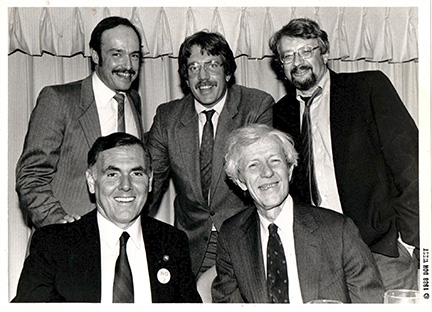
then Boston Mayor Ray Flynn (front left) and Michael Harrington
The people who I thought highly of within the electoral world were George McGovern, basically because his 1972 campaign was anti-war. Also, Ron Dellums, the former Congressman from the East Bay, who was a real stalwart anti-militarist and single-payer health care supporter. And finally, Paul Dwyer, who may be less known, who was anti- war Senate candidate from New York. Dwyer’s brother had been mayor, and the family went way back and they had this magnificent Irish glow. Dwyer was an interesting figure above all.
At one point, I was introduced by Paul Dwyer to make a statement on behalf of George McGovern, and Ron Dellums was in the room. I thought, “Wow, this is as good as it gets.” Those were some electoral figures I truly admired.
There’s a book we read in the DSA Education Committee called ‘The Socialist Awakening,’ by Jon Judis. He states that he thinks the two most important American socialists ever are Eugene Debs and Bernie Sanders. I think that’s quite accurate. So if we’re talking about living, of course, Bernie Sanders. He has put democratic socialism on the map. His campaigns brought American socialism into the 20th century. The question now is getting it into the 21st.
Something that struck me when you recently primaried for office was that you had this idea that you called the ‘Marshall Plan for Latin America,’ or you even stated it as the ‘Romero Plan.’ I believe that this goes back to John F. Kennedy wanting his own Latin American Alliance For Progress, and I think that’s been a long-standing unfulfilled promise. What was your idea behind that? And what can you say about how important that type of policy to our southern neighbors is?
Joe Biden–and to say the least, I have nothing to write home about on foreign policy––has expressed an interest in Latin America, in at least a theoretically positive way. So this ‘Marshall Plan for Latin America’ came up in the presidential debates. I think it was [Julian] Castro who was the candidate early on that mentioned it. I obviously have all the hesitations and disdain for what American foreign policy will do, what it would do, and what it has done in Central and Latin America. On the other hand, for the article I wrote, I took part of my inspiration for this thinking from David Bacon’s book about The Right to Remain Home. It’s about this notion that exists among the organizers in Mexico. The issue that they are dealing with shouldn’t be all about the rights of Mexicans to emigrate and get asylum in the United States. Fundamentally, it should be about making Mexico liveable for people who feel they have to leave it. Many of whom have been destroyed by NAFTA. For example, the corn industry there has been driven under by competition, etc. Also true in Central America, and probably more so at this point.
The main concern that we should have is: why do people have to leave there all the time? It’s not as if the United States is uninterested in doing something like this, or engaging in these areas. We could go through all of the countries of the region, the likes of El Salvador, and Honduras, which have had major US intervention militarily surreptitiously that has been negative. That to me is what we should aim at reversing. And even more broadly, if the United States seems committed to going on with this rivalry with China, then competing on the economic level will be preferable to the military level.
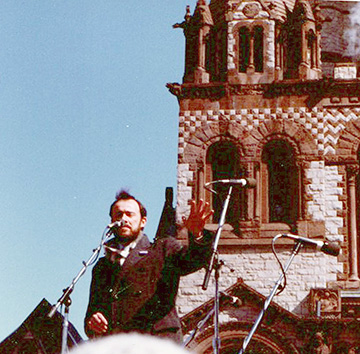
1984 presidential campaign rally
So staying with kind of a foreign policy and outward look, you have done work as a democracy observer with some government organizations like the UN. Please tell your perspective on what that work is like.
So I’ve only done one mission with the UN and that was in East Timor. I’ve done most of my Election Observation––at the beginning, it was called supervision––work with ‘Organization for Security and Co-operation in Europe.’ Most people have no idea who it is, not realizing that the US is the dominant member of an organization that has Europe in its title. We cynics in foreign policy understand this.
So I’ve done most of my work with OSCE. And the one that was with the UN in East Timor, parenthetically, is the one where I really feel I was a part of something where we accomplished something––which is not to put down the other things I did. History changed for East Timor when I was there in 1999. It was all brand new stuff which was extremely important because of what happened after people went in there and did that plebiscite. It’s certainly fascinating work. Another in Bosnia, which I’ve been to about five or six times, we tried to register the whole country. It was a reregistration, from the first one in 1997, and then we went back in 1998. The results in Bosnia were disappointing, but it beat a civil war.
I was in Bosnia for the last one of these things back in 2018. The New York Times, not long after that time, ran some pieces on how segregation has just settled in. They have schools where they have Serb classes in the morning and they have Muslim classes in the afternoon and they are separate within the same building, and not a whole lot of integration has occurred. My translator was Muslim and she was very depressed. Our driver at that time was a former police officer and his wife worked for a local university. And actually, they had all their paperwork set to be off to Frankfurt in a few months, which is basically the goal for anybody there who can and thinks about these things.
Also, people think that because I’ve been through landmine awareness training five times that it sounds really dangerous, etc. But in Bosnia, you never actually felt in danger at any time. There were 40,000, UN troops there, and the two sides were disarmed.
Otherwise––you know these things I’ve done––I look at the newspaper and see all the places I’ve been to and how there are riots going on. For example, I was there during the presidential election in Belarus before this most recent one. And this current one has had continuing demonstrations ever since that one. That one was five years before this where the prior serious contender against Lukashenko was just being released from jail! And I noticed when I started looking into it that there was even an opinion at that time that the OSCE shouldn’t even do these things in Belarus. The opinion was that the government would just say ‘look, we’ve invited the world in and had help.’ However, the report would be totally critical, of course. But it was important to go to Belarus because the conditions were so bad, as it is to go to all these countries.
Has that work framed your perspective in any way on the most recent “insurrection” we saw here in the United States.
I’m not sure what to say about that, but you know I’ve done work in Kyrgyzstan twice. They have a custom in Kyrgyzstan of literally driving their elected government out of office. And I’m not a serious enough student of Kyrgyzstan to be able to make a better pronouncement, but my sense is that the people who drove them out of office were probably in the right. You know, unfortunately, governments settle in and become corrupt extremely quickly. But back to this one here in the USA. This is a farce and fortunately, so. There were people, who, in the discussions, a day or two afterward wondered ‘Is this a coup attempt?’ If you want to take the notion of a coup seriously it involves military preparation or connections with those who have armaments. Fortunately, these people seemed to have neither and that remains to be seen.
Not to jump sideways here. But the thing about Bosnia, for me, and it wasn’t my personal experience, but a thing that really struck me is you could see the force of nationalism grip people. And it was real, in the sense that I remember reading a Croatian writer, Slavenka Drakulić. She was prominent not long ago. She was talking about how the realization that somebody might kill you because you’re a Croat, and somebody who you didn’t have anything in common with politically might protect you because you were a Croat. It’s very visceral, very real in Bosnia. You could just see the absurdity of it there.
Do you know the story about the Dayton Accords? And the simultaneous translation?
I’m not sure the exact story.
Well here’s the height of absurdity. So, the conference is a big international thing to resolve the conflict in the ’90s where all the people are listening through headsets to simultaneous translation. There’s English and there’s Russian. Plus, I’m not sure if it’s French or German, exactly. But then there were Serbian, Croatian, and Bosnian. They were all individual options but if you turned to any one of them, they were the same person. They had to have separate settings because the Croat was not going to listen to Serbian, and the Serbian was not going to listen to Bosnian, etc. But If you’re ever there, you can see that they are all essentially the same language. That’s how ridiculous it was.
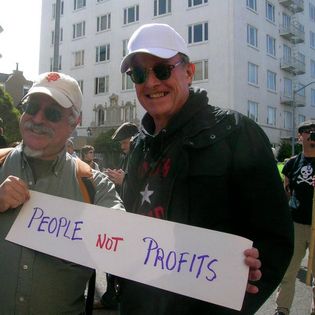
As somebody who has observed elections in other countries and seen the political world of other countries — what do you think of the Left in our country?
Well, the Sanders candidacy put the Left into the mainstream and into the electoral world for the first time in about 100 years, I think. The idea that democratic socialism was something that you could talk about, that it was a coherent point of view, was a major step forward. That said, we now have four members of Congress who are declared socialists, which has never happened before and is pretty damn amazing. So, major step, big step, but kind of coming from nowhere.
The big question for me, I suppose, is the continual idea that the only respectable way for the Left to proceed is to start its own party; one which won’t be burdened with the corporate connections of the Democratic Party. I’m afraid that is a very niche reading of the structure of the American political system. I don’t know if you know, but I wrote a whole book on this. As satisfying as it would be to exist in the party whose policies we could comfortably embrace, compared to being in the midst of a party that is full of people that we oppose. I understand the attraction of it but it’s a dead-end, I’m afraid. It will wind up getting us the worst of the two options.
I think we simply have two parties at this point that have a route to power. You don’t give away the route to power. The centrists in the Democratic party would love for us to go away. They’d have it all to themselves, which would be a tremendous error, in my view.
How important is it for, not just an individual person, but local leaders to keep their eyes on things outside of the United States and on foreign policy issues? I understand you presented war funding on the ballot to the SF voters?
It’s really hard. So, yes we put it on the ballot. We put the Iraq War funding on the ballot and won it there. And that had no real impact on Pelosi. But it is the hardest thing, of course, to get people to pay any attention to any of this stuff. I tried to do a ballot question on Afghanistan not that many years ago. And the way I got the one on Iraq on the ballot, was the easy way.
There are three ways to get on the ballot in San Francisco. The Mayor can do it by him or herself, or, I think it is four members of the Board of Supervisors can put it on, or you can get a very large number of signatures. So the one in the middle is the way to do it, and that’s how the Iraq one got on. We couldn’t get the members on the Board to come along for our Afghanistan one. This included a very left-wing member of the board, who wouldn’t do it because of the potential negative ramifications locally. It was just too obscure. So I would love to do one of these things again.
You look right now, I think there have been the first casualties of Joe Biden’s Iraq War just a couple of days into his presidency. 10 individuals identified as ISIS were killed in a drone strike. So now we have our fourth president, who has worn it to its end: Two Democrats, two Republicans. There are questions about whether the troops from Afghanistan will all be removed in May. And I’m betting Joe ain’t removing them––that would be my guess. Who in this country is paying attention to these things? Ask people if we’re still at war in Iraq. “No, we ended that years ago.” Well, if you call war “bombing”, then we’re at war there. And, obviously, with the money spent on all of this, what could be done with the economy if we re-engineered it to drastically reduce the importance of that is immense. But it is so difficult.
But more broadly speaking, so many people who are politically involved will not touch foreign policy. They fall into reasons like that they don’t know, or it will look bad if we appear soft on terrorism––that used to be communism. And so I emailed my two colleagues about if they knew of anybody or could they think of any ways to make use of the fact that our military policy is extremely environmentally destructive. Not just in its specific uses of oil, etc. and the whole numbers run on that. But on the whole, the way the world is ordered that keeps the rest of the world from actually handling its major problem. So far no one has known of anything. It’s an ignored area.
Further, you talked about the United States military. It’s the largest producer of waste in the world. I think it’s a really important point that you are trying to connect that to people’s fervor for climate change. These are issues on the Left that could be united and need to snowball together.
I just wish I knew what we could do with it.
Could you speak to your book [The Primary Route: How the 99% Takes On the Military-Industrial Complex] that you mentioned?
Well, the book I was referring to is about the electoral system. I’m making the argument that the democratic primaries are the route to relevance. I wrote it before Sanders’ first run. It is not particularly about the military-industrial context in general. The idea was that I had to invent a sociological concept or phrase for our additive and subtractive electoral system, for those who care about such things.
So, if one is in a parliamentary democracy then one campaigns for one’s party in the election, which normally no one agrees with everyone entirely, but the party that most fits your point of view. And when the election is over, parties that have competed vigorously against each other will then form a government where no one has won a majority. And in some countries that goes without saying. Germany, for example, is a textbook example of a parliamentary system, where I don’t think anyone has ever won an absolute majority. It’s possible that the Christian Democrats did in the beginning. But to do it is hard, and it’s not really going to happen. And so after the election, people who understand their fundamental disagreements agree to form a government together because they are closer to each other than to others. There was a great graphic during the 2016 US primaries that apportioned the Sanders vote, the Clinton vote, the Trump vote, and it had Kasich, as well as sort of a moderate Republican. I think that they’d probably lumped other candidates together with him. The graphic had asked, ‘if you were in a parliamentary system, then these would probably be the four main voting blocks or parties.’ You have a socialist party, a liberal party, and then one which can be called a fascist party, but essentially a soft and hard-right parties. And if that were us, then what would have happened in that 2016 election was not what ultimately happened It would have been a coalition government between the liberals and the socialists, the Clinton voters, and the Sanders voters, and the liberals would have controlled it. The socialists would have been critical allies, as is the case in any parliamentary system. The reason you could do that is that you can add your votes together afterward, you can add the seats together.
But in the U.S. Presidential system, it’s essentially subtractive. Take the Ralph Nader campaign in 2000, which I supported because I thought things were possible that turned out not to be possible. But the argument isn’t whether or not precisely that Nader’s candidacy put Bush into office, but it is also about the perception of it. So, I mean, we can debate about the Florida ballot, etc. However, when you were voting for Ralph Nader, your vote was subtracted from those also on the Left side. And it enhanced the chance of somebody, possibly the candidate that you liked least, in getting elected. By the way, this is also true on the Right side, where the libertarian party votes take away from the potential voters that a Republican gets. Here you cannot add them together after the election, as you can in a parliamentary system where you choose the prime minister from the total of the members elected. Since you can’t do that, you wind up with the option of getting the worst of the two evils, rather than the least of them.
Running within one of the main parties seems to be the best way to get elected. And, for all the faults that we find in the Democratic Party, and between the Democratic Party and Republican Party, the Democratic Party is preferable. Sanders succeeded when he did that in 2016, beyond anyone’s wildest beliefs. I see people talking about, “ow, this is proof that you can’t get anywhere.” I think it proves the exact opposite. It proves you can get somewhere. Think of where we were in 2012: Nowhere.
If you had a magic wand, what policy would you fix nationally?
Well, it’s broad, but number one, I would want to fix our foreign policy. The United States has the luxury of being able to do things that no other country does because we are outspending, I think, the next seven countries on the military. If we wished to put out an olive branch to the world. If we wish to tell China, “Ok, this should not be a military matter. We will disagree on many things and our trade may conflict. We may deplore various aspects of your human rights policy domestically, but we are not interested in militarizing. Can we both, and everyone else, really start to wind this backward and come to grips with the fact that we are destroying the only planet we have?” That would be wonderful, but of course, that’s exactly our policy history, unfortunately.
The various things that are put forward in Congress to limit the disparity of income within various corporations and so forth would be major. There ain’t nobody who can contribute value that’s more than five times someone else. It just doesn’t happen, and of course, we know the difference.
Is there anything specific about San Francisco at the current time to change? Or even when there is a “reset”––is there something that the City could improve?
To take the most obvious visually: our homeless situation is preposterous. No one would have believed this. A big part of that problem is that it’s not just a local problem. There is not necessarily enough money available, even for San Francisco, to handle it. But if I could wish away one thing, it’s how street after street there are encampments of people in very desperate situations. But I’m not saying anything that a mayor of the City hasn’t said for 20 or 30 years.
Featured image courtesy of Heidi Alletzhuauser Photography



